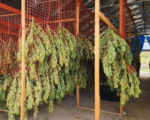A fresh attempt to bring recreational cannabis to Oklahoma is moving out of neutral. The group behind it is hoping the state’s large base of medical users could tip the scales in their favour.
Oklahomans for Responsible Cannabis Action (ORCA), the group leading the charge, will begin collecting signatures next month in a high-stakes bid to get their adult-use cannabis measure on the ballot. With nearly 173,000 valid signatures needed, the effort is no small task—but the group says public sentiment is shifting.
The Numbers That Matter
You can’t underestimate the power of numbers in politics. ORCA needs 172,993 verified names from registered voters. That’s not a suggestion; it’s the legal threshold to put a constitutional amendment on the ballot.
The hopefuls behind the campaign are banking on Oklahoma’s unusually high rate of medical marijuana cardholders—roughly 330,000 people—as a core base of support.
Two numbers. One chance.
To be clear, this isn’t the first time Oklahomans have seen cannabis on a ballot. The state legalised medical use back in 2018. But turning that into full recreational use? That’s a different fight entirely.

Why This Attempt Feels Different
There’s something about this latest campaign that feels, well, more prepared. ORCA filed their amendment in April with language that’s both ambitious and strategic. They’re going for a constitutional amendment—not just a statutory change—which, if passed, would be much harder for lawmakers to reverse later.
Jed Green, ORCA’s director, told KOSU the group is encouraged by the sheer number of people already in the cannabis system. That’s not just data—it’s momentum.
“This isn’t just a petition; it’s a statement,” Green said. “The public’s voice is ready to be heard.”
And let’s face it—Oklahoma’s cannabis scene is already huge, even under medical rules. The state has one of the highest per capita rates of cannabis business licenses in the country. So the infrastructure? Already there.
What’s Actually In the Proposal?
The proposal isn’t some vague wish list. It spells out exactly what it would allow—and what it wouldn’t.
Here’s what the amendment aims to do:
-
Allow adults 21+ to purchase and possess cannabis legally
-
Impose a 15% excise tax on recreational sales
-
Establish a separate regulatory structure from the existing medical market
-
Support expungement of past non-violent cannabis convictions
Unlike some previous efforts, this proposal doesn’t mess around with technicalities. It’s trying to cover the economic, legal, and social bases in one swoop.
Also notable: the structure includes a “local option” allowing municipalities to regulate dispensary locations, something lawmakers on both sides of the aisle have asked for in the past.
Political Climate Could Be Trickier This Time
Let’s not sugarcoat it—support for adult-use cannabis in Oklahoma has always been complicated. The medical market passed with a strong majority, yes, but recreational use is still a line some voters don’t want to cross.
The last attempt to legalise adult-use via ballot failed in March 2023, and the campaign behind it struggled with funding and messaging. Voters rejected it by a fairly wide margin: about 62% voted against.
That said, this new push isn’t a carbon copy of the old one. It’s aiming for a different tone and more grassroots momentum.
State lawmakers? Mixed reactions. Some Republicans have expressed concern about regulation chaos. Meanwhile, a few Democrats say legalisation could help reduce arrests and boost tax revenue. A classic policy tug-of-war.
Supporters Say Economic Benefits Are Too Big to Ignore
Beyond the politics, there’s money. A lot of it.
According to a 2022 study by Whitney Economics, legalising adult-use cannabis in Oklahoma could generate nearly $1.8 billion in total economic activity within five years. That’s nothing to scoff at, especially in rural parts of the state looking for new revenue streams.
Tax projections aren’t trivial either. A 15% excise tax—on top of state and local sales taxes—could add up quickly. Even modest projections suggest more than $100 million annually in new tax revenue once the market matures.
Here’s a quick breakdown:
| Category | Estimated First-Year Impact |
|---|---|
| Retail Sales | $500M+ |
| Excise Tax Revenue (15%) | $75M |
| New Jobs Created | 10,000+ |
| Criminal Justice Savings | Unknown, but significant |
Add to that the potential savings from lower incarceration rates and court costs, and the economic case gets even stronger.
Looking Ahead: August Could Be Pivotal
Signature collection is expected to begin in August. From there, the group has 90 days to hit the nearly 173,000 valid signature mark.
That’s where things get real.
The state’s Election Board will then verify the signatures. If the campaign clears that hurdle, the question would go on the next general election ballot, potentially in 2026—unless the governor sets a special election date sooner.
Of course, it’s all hypothetical until the petitions are filed and checked. But optimism is growing in activist circles.
And if you’re wondering whether people will care? Look no further than Oklahoma’s cannabis dispensaries. Business is already booming. A shift to adult-use could send things into another gear entirely.
Maria Garcia is an award-winning author who excels in creating engaging cannabis-centric articles that captivate audiences. Her versatile writing style allows her to cover a wide range of topics within the cannabis space, from advocacy and social justice to product reviews and lifestyle features. Maria’s dedication to promoting education and awareness about cannabis shines through in her thoughtfully curated content that resonates with both seasoned enthusiasts and newcomers alike.








